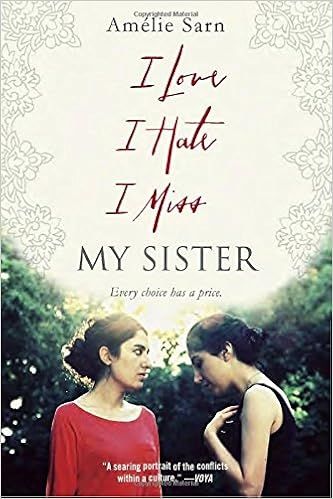 I discovered I Love I Hate I Miss My Sister by Amélie Sarn on a list of exceptional memoirs and autobiographies. This is frustrating mainly because, upon actually looking at the book, it is a YA novel, and not a memoir or an autobiography. However, it does deal with some issues which are extremely relevant today. As for the cover, I quite despise the artwork and the "every choice has a price" tagline. Blech!
I discovered I Love I Hate I Miss My Sister by Amélie Sarn on a list of exceptional memoirs and autobiographies. This is frustrating mainly because, upon actually looking at the book, it is a YA novel, and not a memoir or an autobiography. However, it does deal with some issues which are extremely relevant today. As for the cover, I quite despise the artwork and the "every choice has a price" tagline. Blech!I Love I Hate I Miss My Sister was translated from French. Since I'm not a French speaker, I read it in English, and I wonder if that explains why the prose sometimes felt clunky to me, especially the dialogue. Other times, it just seemed "off" and unnatural. So, for English readers who would like to read a book with natural-feeling prose and realistic-sounding dialogue, this translation isn't it.
My main issue with the book is that it was based upon a true story. The Author's Note in the back of the book explains that Sarn was inspired by a true event which happened in France in 2002. *Spoiler alert.* It says, "...Sohane Benziane, a seventeen-year-old French girl of Algerian descent, who was murdered. Sohane Benziane was doused with gasoline and burnt alive by Jamal Derrar, a boy who was said to be settling a score with Sohane's boyfriend."
My problem is that, in the book, Sohane's sister Djelila is murdered when a boy from her neighborhood burns her alive after dousing her with gasoline. She has no boyfriend mentioned in the text, and the murder is motivated by the boy's fury that Djelila dresses and acts like a modern, secular girl when she is from a Muslim background and family. (She smokes, drinks, plays sports, and wears clothing that is considered immodest by observant Muslim standards, at least according to this boy and his posse.) After bullying her, trying to intimidate her, following her around the neighborhood, and threatening her repeatedly, he slaps her. Then, the murder occurs. Djelila is upset, but never acts intimidated, and doesn't back down on her personal expression of herself. She also doesn't perform religious observance that doesn't fit with her own beliefs or feelings just to appease her tormentors.
So, while I understand how learning about Sohane Benziane's murder would give Amélie Sarn the idea for the book, slapping meaning on it that had nothing to do with the actual events seems insulting to Benziane's memory and random. Nowhere in the short summary of the events surrounding the actual murder is there any mention of modesty policing or anything related to that. So, maybe not using the name (and also randomly giving it to the character of her sister, instead of the girl who is actually murdered) is ill-fitting and a poor choice.
Because of disrespect for an actual murder victim, I absolutely cannot recommend this book, which is sad, because I feel it does make some good points about a Muslim woman's own choice to wear or not wear a headscarf and how society should respect and respond to that.
No comments:
Post a Comment